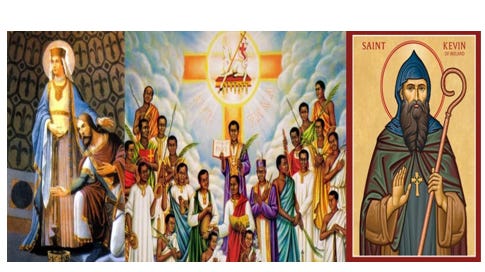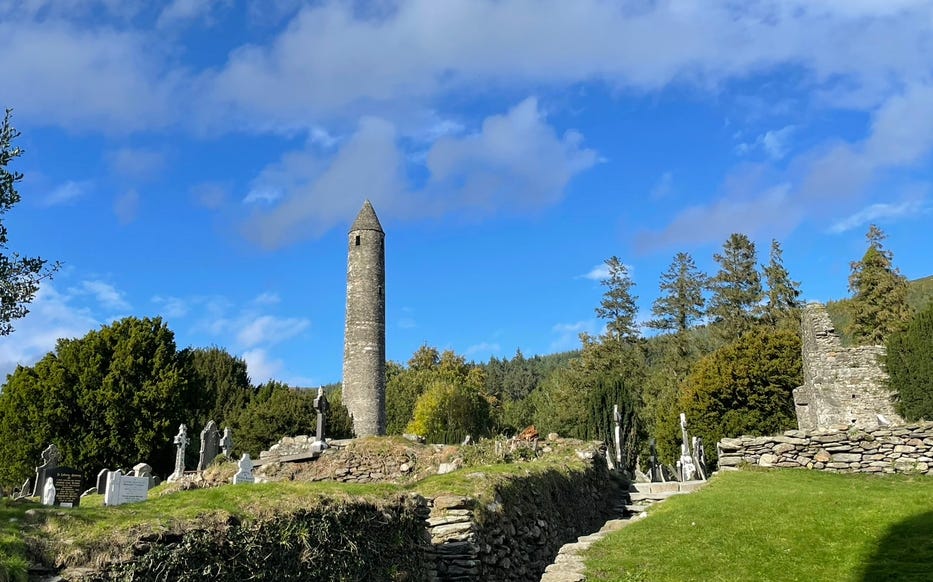Today is the feast of multiple inspiring saints from around the world. St. Clotilde was key in the conversion of France to Christianity—France, the “Eldest Daughter of the Church.” The Martyrs of Uganda all witnessed to the truth even to the shedding of their blood. And St. Kevin of Glendalough is one of the greatest saints from the Isle of Saints and Scholars (Ireland).
Jesus commanded His followers (Matt. 5:48), “Be you therefore perfect, as also your heavenly Father is perfect.” The Catholic Church canonizes individuals who followed Christ so well that they displayed heroic Christian virtue. These saints inspire us as role models and can act as intercessors with God for us.
Jesus told His apostles and disciples (Matt. 28:19), “Going therefore, teach ye all nations; baptizing them in the name of the Father, and of the Son, and of the Holy Ghost.” St. Clotilde took that command seriously, and won a country for Christ.
“[Catholicsaints.info] Born a princess, the daughter of King Chilperic of Burgundy. Married young to King Clovis of the Salian Franks while he was still a pagan; she brought him to the faith. Queen. Mother of three sons. Led her husband to Christianity in 496. Widow. Following Clovis's death in 511, her sons fought for years over the kingdom. To escape the constant murder and intrigue, she retired to Tours, France where she spent her remaining 34 years caring for the poor and sick.”
Historian Gregory of Tours (c.539-594) adds the following information:
“Clovis took to wife Clotilde, daughter of the king of the Burgundians and a Christian. The queen unceasingly urged the king to acknowledge the true God, and forsake idols. But he could not in any wise be brought to believe until war broke out with the Alemanni. . . . The two armies were in battle and there was great slaughter. Clovis' army was near to utter destruction. He saw the danger . . . and raised his eyes to heaven, saying: Jesus Christ, whom Clotilde declares to be the son of the living God, who it is said givest aid to the oppressed and victory to those who put their hopes in thee, I beseech thy . . . aid. If thou shalt grant me victory over these enemies . . . I will believe in thee and be baptized in thy name. For I have called upon my gods, but . . . they are far removed from my aid. So I believe that they have no power, for they do not succor those who serve them. Now I call upon thee, and I long to believe in thee. . . . When he had said these things, the Alemanni turned their backs and began to flee. When they saw that their king was killed, they submitted to the sway of Clovis, saying . . . Now we are thine.
After Clovis had forbidden further war and praised his soldiers, he told the queen how he had won the victory by calling on the name of Christ. Then the queen sent for the blessed Remigius, bishop of the city of Rheims, praying him to bring the gospel of salvation to the king. The priest, little by little and secretly, led him to believe in the true God . . . and to forsake idols, which could not help him nor anybody else.”
There are very few rulers, whether monarchs or otherwise, who use their power primarily for doing good. Clothilde was a stellar example of how a Christian leader should act.
Jesus said, “Blessed are ye when they shall revile you, and persecute you, and speak all that is evil against you, untruly, for my sake: Be glad and rejoice, for your reward is very great in heaven. For so they persecuted the prophets that were before you.” (Matt. 5:11-12) The Martyrs of Uganda, who died between November 15, 1885 and January 27, 1887 in Namugongo, Uganda, followed so closely in Christ’s footsteps that they, like Jesus, were killed. Uganda is now a majority-Christian nation, but Christians still suffer from Islamic jihadi violence there. Now as then, being Christian in Uganda demands heroic courage.
“[Catholic News Agency] In 1879 Catholicism began spreading in Uganda when the White Fathers, a congregation of priests founded by Cardinal Lavigerie were peacefully received by King Mutesa of Uganda.
The priests soon began preparing catechumens for baptism and before long a number of the young pages in the king’s court had become Catholics.
However, on the death of Mutesa, his son Mwanga, a corrupt man who ritually engaged in pedophilic practices with the younger pages, took the throne.
When King Mwanga had a visiting Anglican Bishop murdered, his chief page, Joseph Mukasa, a Catholic who went to great length to protect the younger boys from the king’s lust, denounced the king’s actions and was beheaded on November 15, 1885…The following May, King Mwanga learned that one of the boys was learning catechism. He was furious and ordered all the pages to be questioned to separate the Christians from the others. The Christians, 15 in all, between the ages of 13 and 25, stepped forward. The King asked them if they were willing to keep their faith. They answered in unison, ‘Until death!’”
They were martyred at different times after, most by being burned to death, like Charles Lwanga. Read the full story at CNA.
Even in America, especially with the current rising violence, it is possible that we could face martyrdom. But even those who are not martyred face ridicule and less violent persecution for their faith (we are in Pride Month). Let us pray to the Martyrs of Uganda that, be our challenges great or small, we will overcome them all with courage and faith.
The third saint today, like Jesus (Matt. 4, Lk. 4), wished to go out into the wilderness alone to pray. Ultimately, he founded a great monastic community that blessed Ireland for centuries. One can still visit the ruins today, as I was so fortunate as to be able to do last October. Amidst the magnificent scenery of Glendalough, its greenery so different from the desert in which Jesus lived—and yet such a perfect reminder of the goodness of Creation—Saint Kevin dedicated his life to God.
[Catholicsaints.info] Son of Coemlog and Coemell, Leinster nobility. Baptized by Saint Cronan of Roscrea, and educated by Saint Petroc of Cornwall from age seven. Lived with monks from age 12. Studied for the priesthood in Cell na Manach (Killnamanagh). Student of Saint Eonagh. Priest, ordained by bishop Lugidus. Monk. Acquaintance of Saint Comgall, Saint Columba, Saint Cannich, and Saint Kieran of Clonmacnois.
Following his ordination, he lived as a hermit for seven years into a cave at Glendalough, a Bronze Age tomb now known as Saint Kevin's Bed, to which he was reportedly led by an angel. He wore skins, ate the nettles and herbs that came to hand, and spent his time in prayer. Word of his holiness spread, and he attracted followers, including Saint Moling. Founded the monastery at Glendalough, which included relics brought back during a pilgrimage to Rome, Italy. This house, in turn, founded several others, and around it grew a town which became a see city, though now subsumed into the archdiocese of Dublin. Served as abbot for several years. When he saw that the monastery was well-established, he withdrew to live as a hermit. Four years later, however, he returned to Glendalough at the entreaty of his monk, and served as abbot until his death at age 120. King Colman of Ui Faelain entrusted Kevin with raising his son.
Noted as a man who did not always like the company of men - but was at home with the animals, as some of the legends surrounding him show.
During a drought, Kevin fed his monks with salmon, a symbol of wisdom, brought to him by an otter. When one of the monks considered making gloves out of the otter's pelt, it left and never returned.
Once during Lent, while he held his arms outstretched in prayer, a blackbird laid an egg in the Kevin's hand. He remained in that position until the baby bird hatched.
A cow which habitually licked Kevin's clothes while the saint was in prayer gave as much milk as 50 other cows.
Lacking milk to feed the son of King Colman, Kevin prayed for help. A doe arrived to provide for the baby. When the doe was later killed by a wolf, Kevin chastised the killer; the wolf then provided the milk herself.
A young man with severe epilepsy received a vision that he would be cured by eating an apple. There were, however, no apple trees about. Kevin, seeing the lad's need, ordered a willow to produce apples; twenty yellow apples appeared on the tree.
In his old age, King O'Tool of Glendalough made a pet of a goose. As time passed, the goose also became aged and weak, and finally unable to fly. Hearing of Kevin's sanctity and power, the pagan king sent for him, and asked that he make the beloved goose young. Kevin asked for a payment of whatever land the goose would fly over. As the goose could no longer take flight, O'Toole agreed. When Kevin touched the bird, it grew young, and flew over the entire valley that was used to found the monastery of Glendalough.
A boar was being chased by a group of hunters with their dogs. It ran to where Kevin sat praying under a tree, and cowered beside him for protection. When the dogs saw the saint in prayer, they laid on their stomachs, and would not approach the boar. When the hunters decided they would ignore the man and kill the boar, a flock of birds settled in the tree above the praying saint. The hunters took this as a sign, and left man and beast alone.”
Amidst the chaos, evil, and noise of modernity, we should try to take time to be alone with God as Saint Kevin did. It is in the silence that God speaks to us.







